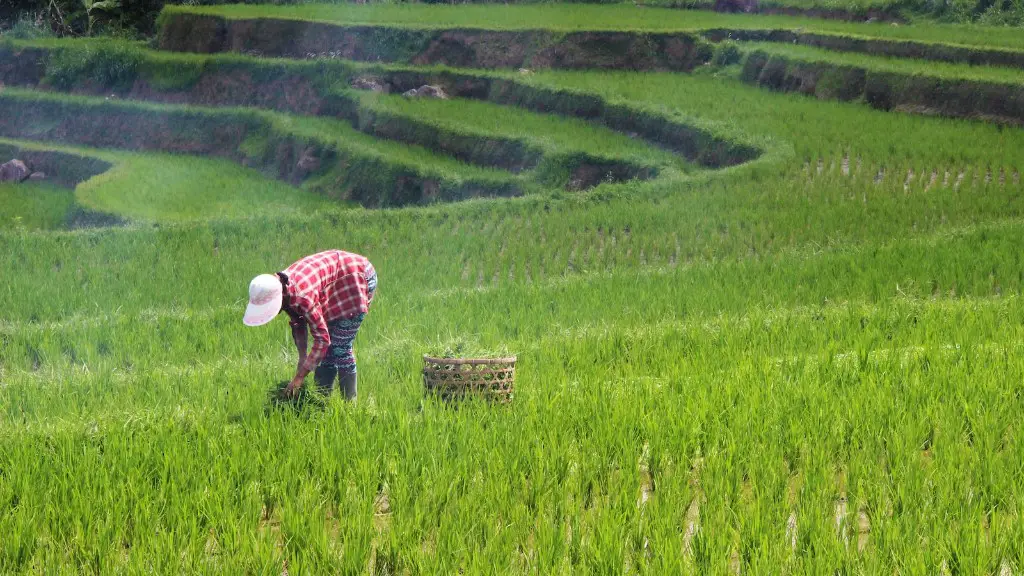Earning an agricultural degree opens many doors, allowing students to pursue careers that are fulfilling and lucrative. Depending on one’s education and experience, graduates can work in the agricultural products industry, conservation, research, teaching, and more. Below are just some of the career options available to graduates of agricultural programs.
The Agricultural Products Industry
With an agricultural degree, one can work in the agricultural products industry. This includes managing animal farms, working with commodities such as grains, fruits, and vegetables, and providing technical support for agricultural products. In this sector, graduates can work in production, sales and marketing, research and development, and more. Graduates have the opportunity to gain experience in a wide variety of areas and develop skills that are applicable to different industries.
Conservation and Environment
Agricultural degrees can prepare graduates for a career in conserving natural resources, protecting the environment, and promoting sustainable agriculture practices. Graduates may work for conservation organizations, government agencies, or private land managers. They may also work in research fields such as plant pathology, soil sciences, and pest management. Additionally, graduates may work in the educational sector and teach the public about conservation and agricultural practices.
Research
Agricultural degree holders may pursue a career in research. They may conduct their own independent studies or work for research centers or universities. In this field, graduates may explore topics such as the effects of genetic modification, the impact of climate change on agriculture, or the viability of new technologies for crop improvement.
Food Science and Technology
Graduates of agriculture programs may also pursue a career in food science and technology. This field encompasses the production, processing, packaging, and distribution of food and beverages. Graduates can work in product development, quality assurance and safety, packaging, and operations management. Additionally, they may work with government agencies on food safety laws.
Teaching
Agricultural graduates can also opt to teach high school or college students. Their courses may cover a range of topics, including agronomy, animal science, crop science, horticulture, entomology, and food science. They may also provide guidance on career paths, curriculum options, and industry-related information.
Agribusiness and Business Management
Upon completing an agricultural degree, graduates can explore opportunities in agribusiness and business management. In these positions, graduates may utilize their knowledge of agricultural productivity to evaluate efficiency and advise on strategies for production. They may also develop business plans, manage resources, and provide advice on marketing and finance.
Government and International Affairs
Finally, graduates may work in government and international affairs. They may work in policy analysis, international trade and development, and marketing of agricultural products, or they may support government agencies in their efforts to ensure agricultural sustainability. Government and international affairs involve collaboration with international and governmental bodies, providing graduates with vital experience in a global context.
Certifications Available
Fortunately, agricultural graduates have numerous certification options available to them. For example, they may wish to pursue a certification in organic agriculture, food safety, farm management, or agri-business. These certifications can open up additional doors and provide a path to further specialization and higher-paying positions.
Career Advancement Opportunities
Graduates of agricultural programs have several options for advancing their career. They may use their experience to move up the ladder within their current organization, take on a leadership role at a different company, or even pursue higher education and potentially a degree in a related field. With an advanced degree and/or more experience, agricultural graduates can often gain access to greater responsibilities and higher salary offers.
Continued Professional Education
Agricultural graduates should also make sure to stay updated on the industry and its continual advancements. Professional development opportunities, seminars, and conferences can help graduates stay informed and build a visible network. Participating in workshops, webinars, and other educational events can help keep their skillset current and open access to new job opportunities.
Making Connections
Making professional connections is another integral component of career growth for agricultural graduates. They should strive to make connections with professionals in the field and through online channels such as social media. This can help them stay current on industry trends, find out about job postings, and access valuable resources and advice.
Interests and Valuable Skills
Agricultural graduates should determine what interests them and what skills they possess, as this often plays a major role in their job search and subsequent success. Do they prefer to work outdoors? Or in the laboratory? Do they have a lot of experience in sales and marketing? Or are they more analytical and analytical reporting? Knowing one’s interests and skill set can greatly boost the job search process and allow graduates to pursue more meaningful and fulfilling careers.



